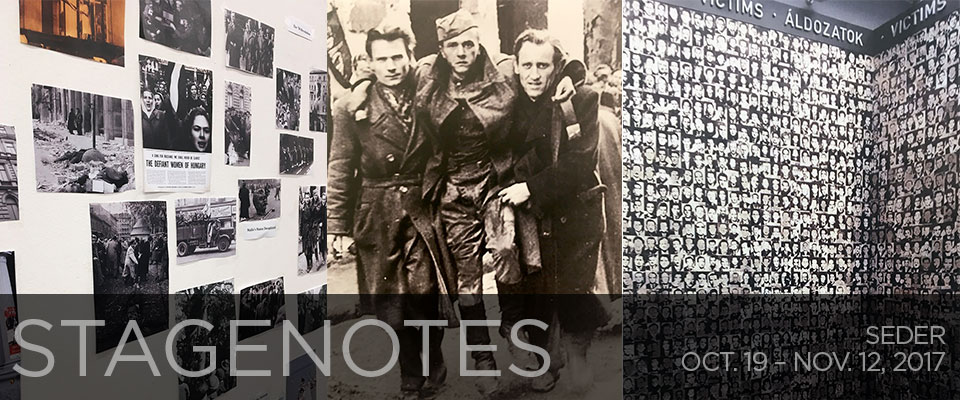

Past Issues
- A Midsummer Night’s Dream
- Our Great Tchaikovsky
- Heartbreak House
- The Absolute Brightness of Leonard Pelkey
- Cloud 9
- The Comedy of Errors
- A Christmas Carol
- The Piano Lesson
- Queens for a Year
- Anastasia
- Having Our Say
- Romeo & Juliet
- The Body of an American
- A Christmas Carol (2015)
- Rear Window
- An Opening in Time
- Kiss Me, Kate
- The Pianist of Willesden Lane
- Reverberation
- Private Lives
- A Christmas Carol (2014)
- Hamlet
- Ether Dome
A Conversation with Stage One Member Jacqueline Iacovazzi
By Scott Bartelson and Theresa MacNaughton
 Hartford Stage recently spoke with inaugural Stage One member Jacqueline Iacovazzi, Advocacy Manager of Global Government Relations for United Technologies. Stage One was created two years ago as an initiative to engage young professionals in the Greater Hartford area who are passionate about Hartford Stage and can be leaders and advocates for the theatre in their communities and peer groups. Stage One members honor the mission of Hartford Stage and act as observers to the Board of Directors, preparing them for future nonprofit board service.
Hartford Stage recently spoke with inaugural Stage One member Jacqueline Iacovazzi, Advocacy Manager of Global Government Relations for United Technologies. Stage One was created two years ago as an initiative to engage young professionals in the Greater Hartford area who are passionate about Hartford Stage and can be leaders and advocates for the theatre in their communities and peer groups. Stage One members honor the mission of Hartford Stage and act as observers to the Board of Directors, preparing them for future nonprofit board service.
Since her appointment to Stage One, Iacovazzi has passionately promoted StagePass, Hartford Stage’s subscription for modern audiences, and also served on the 2017 Gala Committee.
Why were you interested in being a part of Stage One?
Hartford Stage is a treasured institution within the city; and its mission to enrich and entertain the community is especially meaningful to me. As a young professional, joining a nonprofit board is something I aspired to do. My lifelong love and passion for the theatre, along with my desire to engage more in the community in which I live and work, is the main reason I was interested in becoming a part of Stage One.
What role do young professionals have at the theatre?
Young professionals have a unique (and frankly, amazing) opportunity to subscribe to the Hartford Stage via StagePass. If you’re between 21 and 35 years old, you receive unlimited admission to every show for just $99 a season. My husband and I have loved StagePass! Young professionals, and Stage One, are stewards of this fantastic subscription opportunity. Young professionals are tomorrow’s leaders; and the role of this group, or those StagePass holders, is to help infuse the Stage with a new energy. Friends tweeting, posting or sharing photos of playbills or video clips of a bustling theatre before curtain – it all adds to the fun and wonder that is Hartford Stage.
How has your experience on Stage One shaped your views of Hartford Stage?
Through Stage One, board members and the incredible staff of the theatre, I’ve come to have an even deeper appreciation and adoration for Hartford Stage. Hartford Stage is more than just the beautiful works performed each season. Hartford Stage is a source of inspiration and education for the community. Since joining Stage One, I’ve come to learn so much about the amazing education programs it conducts. Over 20,000 children and adults are served through our education department each year. These programs shape future performers, audience-goers and community members and promote creativity, collaboration and critical thinking. It’s remarkable what that does for a community!
What are some of the upcoming goals or activities Stage One is hoping to implement at the theatre?
Over the summer, Stage One hosted a “Beer and Baseball” event at the theatre. The event brought friends (21+) to Hartford Stage to meet, drink and mingle before going to a Yard Goats game. Stage One is looking to implement similar opportunities at Hartford Stage that bring folks into Hartford, engage with the theatre, and get them excited to be in this community. Stage One wants to create an open, inviting atmosphere for all at Hartford Stage. We are working to create events similar to our “Beer and Baseball” bash to get folks excited about being at 50 Church Street. PSA: You don’t need to be a theatre connoisseur! There are so many great people to meet and topics to discuss around the performances that Stage One wants to ensure folks don’t miss out.
Why should younger generations attend the theatre and support the arts?
Millennials are known to want “experiences” versus “things;” and what a wonderful experience it is to see a play or attend a post-show discussion at Hartford Stage. I believe younger generations should attend the theatre and support the arts because it is the arts that give life to our culture and our story. The quote has been repeated ad nauseam, but it’s true, when asked to cut the funding for the arts during WWII, Sir Winston Churchill responded “then what are we fighting for?” In a time of global anxiety and ever changing political environments, the arts have a special way of bringing people together.
